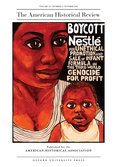This article reconstructs and interprets the early history of the Liberated African villages of Sierra Leone, a group of settlements built to settle former captives rescued from the Middle Passage by British ships following the 1807 Slave Trade Act. The Act, which abolished the British slave trade, was designed to be most effective in wartime, making slave ships into prizes eligible for capture. In Sierra Leone, a colony with a longstanding association with British anti-slavery, the end of the Napoleonic Wars caused an economic shock. The colonial Governor, Charles MacCarthy, established the Liberated African villages to organize the labor of former captives and to manage and distribute colonial resources. The “village system” was organized from the colonial capital, Freetown, but was managed in the hinterland villages by missionaries, recruited by the Church Missionary Society. What began as a plan to shore up the postwar colonial economy became, in practice, a potent engine for social engineering, cultural transformation, and labor control. In the Liberated African Villages, British antislavery was remade as a new and expansive colonialism.
Publication Type
- Article



